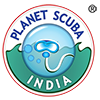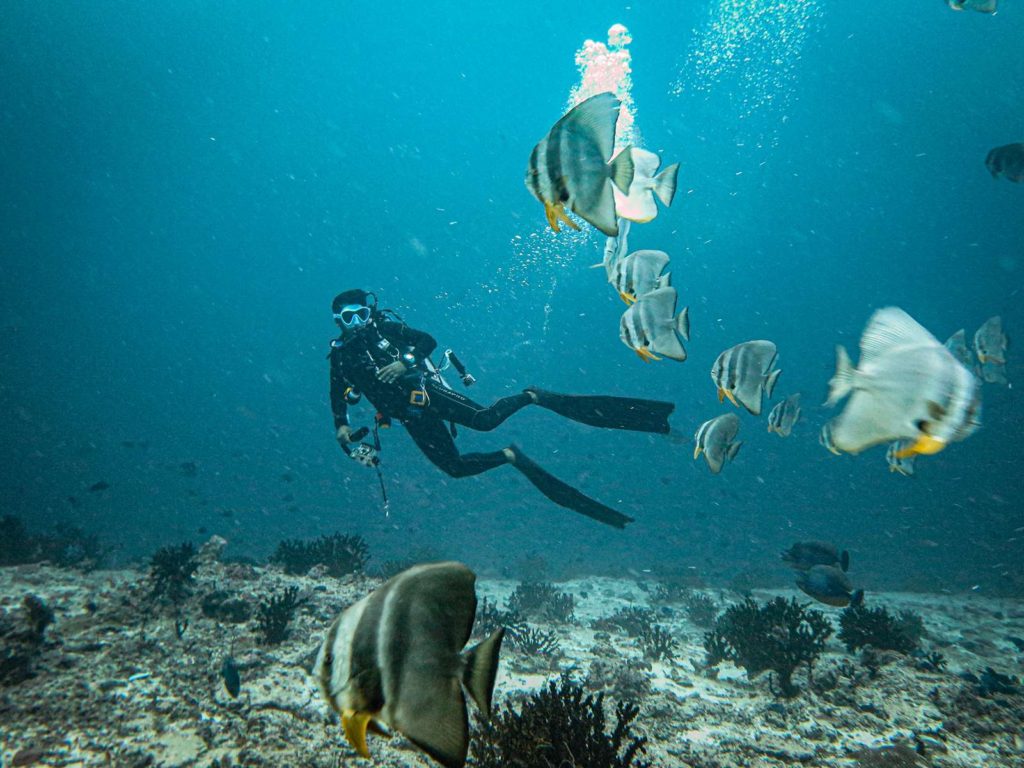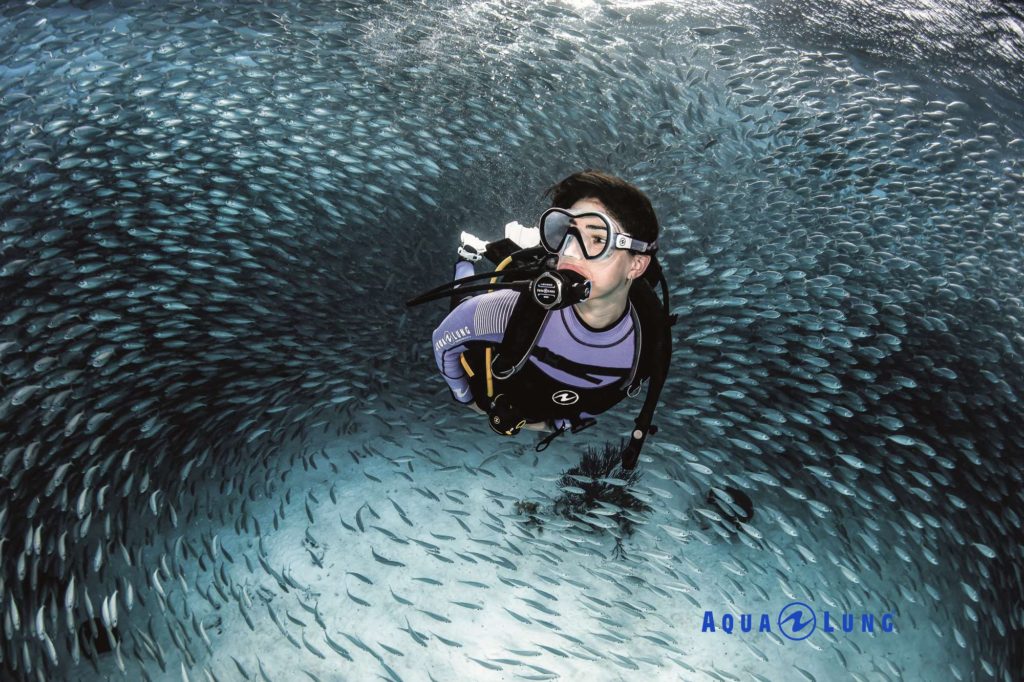When most people think about scuba diving, they picture vibrant coral reefs, sea turtles and fascinating marine life. And though, these are definite reasons to go scuba diving, they are not all that diving has to offer. Did you know that scuba diving has a multitude of positive health benefits? Yes, we are talking of scuba diving for Fit India! Some of the scuba diving health benefits are derived from the physical activity it entails. But there are also proven mental health benefits. In fact, you might be surprised to learn just how far reaching the effects of scuba diving are on both your physical and mental well-being.
Scuba Dive for Fit India & A Healthier You
Here are just a few key benefits you experience when you go scuba diving in India:
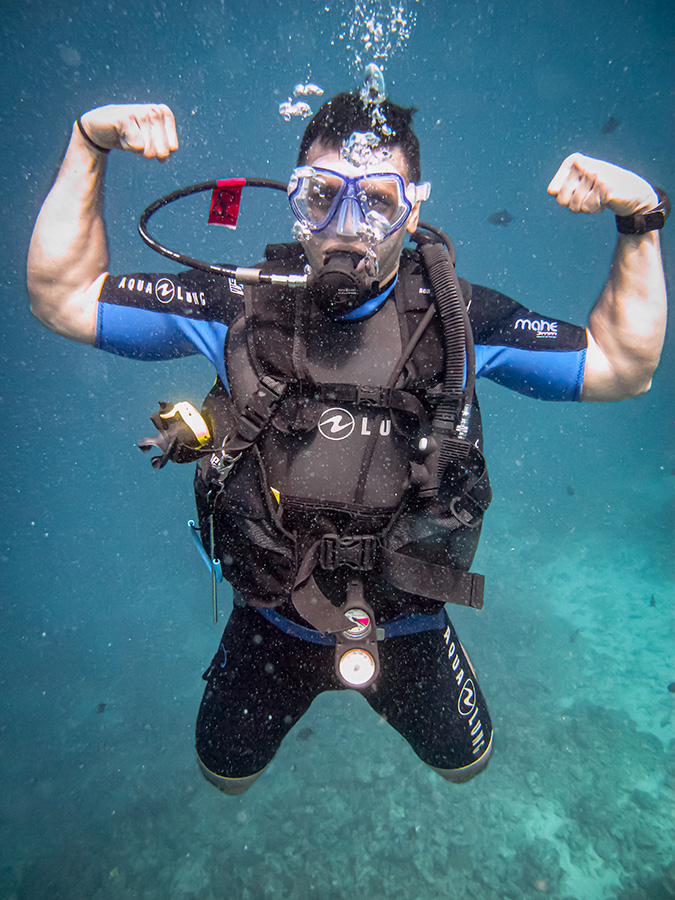 1. It improves your breathing and respiratory system.
1. It improves your breathing and respiratory system.
Scuba diving encourages divers to take long, slow, deep breathes. A calm, slow breathing pattern reduces the risk of a lung-expansion injury while diving. But did you know that it also helps reduce mucus build up?! This breathing pattern has also been known to help with existing conditions, such as asthma. The breathing technique used during diving is similar to that used during some styles of meditation, including yoga. It helps slow down your heart rate, promoting a state of peacefulness. Slow rhythmic breathing can also have a calming effect on your psyche.
2. It increases your fitness levels, strength and flexibility.
Have you heard of resistance training? When you go scuba diving, you’ll be doing that too! Your muscles have to work harder underwater than they would on land due to the increased resistance caused by the water around you. The level of resistance increases significantly when you are swimming against even a mild current. That’s why we recommend scuba diving for Fit India. The more you dive and swim, the more your muscles begin to strengthen. And you’ll also develop endurance as well as flexibility. Scuba diving and swimming doesn’t only give your legs a workout. It can also help build up your core strength, which is important for a good overall posture.
3. It lowers your blood pressure
Remember the first time you went underwater? In all likelihood, you would have experienced a spike in blood pressure. Most divers do, due to the excitement and adrenaline. But this is usually only a temporary increase. Once you have recovered from the initial spike, your heart rate reduces, so does your blood pressure. The slow and deep breathing technique you learn helps lower your blood pressure and keeps you calm throughout the dive.
4. It introduces you to the spectacular marine life underwater
Seeing stunning coral reefs and a fabulous array of fish and critters is enough to put anyone in a good mood. Also, it has been proven that seeing certain colors can affect the brain in many different ways. Scientists believe that being subjected to bright, intense colors, similar to the ones we might find surrounding reefs, can promote feelings of happiness. It can uplift your mood. In addition, the color blue has been known to induce a calming effect on the body.
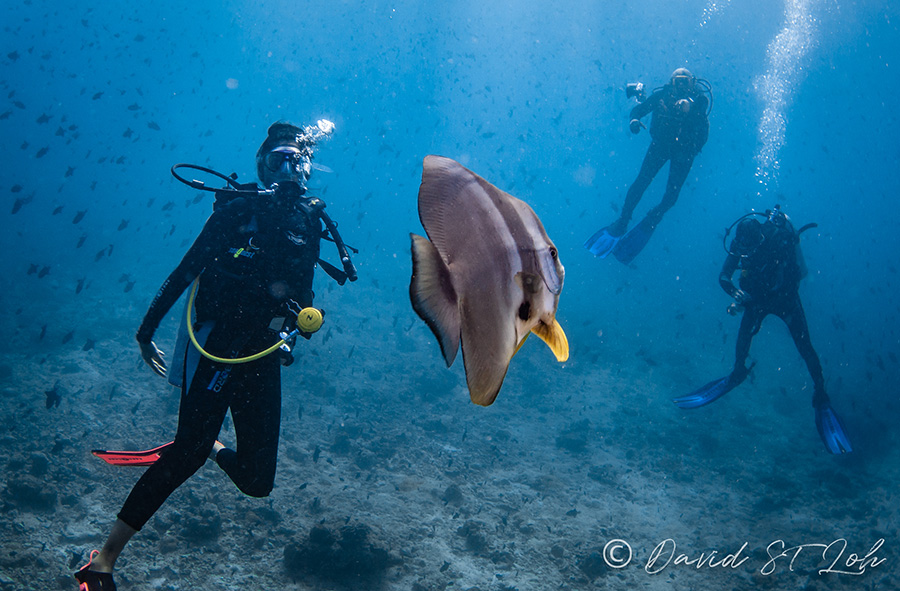 5. It encourages you to travel around the world on an adventure
5. It encourages you to travel around the world on an adventure
Yes, it is possible to dive virtually anywhere on the planet that has a body of water. However, divers tend to travel more than they dive at home. Traveling overseas, exploring and taking time off work, all lead to adventures, excitement and positive experiences. All of which are good for your body, mind and soul. Infinitely much better than being stressed, bored and stuck in a rut, don’t you agree?!
6. It provides you with the healing effects of water
Being underwater has many healing benefits. The likeness to being in the womb is believed to promote feelings of security, well-being and happiness. In addition, being in salt water for long periods of time can cause your body to dehydrate meaning that you tend to drink a lot more after the dive. This in turn means that you are replenishing your cells. You are receiving all the benefits of water both externally and internally.
7. It exposes you to sunlight
Being exposed to sunlight creates vitamin D. Vitamin D helps the absorption of calcium, which in turn keeps bones healthy and strong. Exposure to sunlight also helps increase endorphin production. Now you know why we scuba divers are a happy lot.
8. It has socializing benefits
Diving is a social activity. It involves diving with a buddy. And among divers, we find like-minded people with a common interest. There is a sense of community. A sense of being part of a ‘tribe’ when spending time with other divers. All of which are positive feelings and good for your mental well-being. Did we mention that it also helps lower stress, building confidence and gives you a sense of security and belonging!
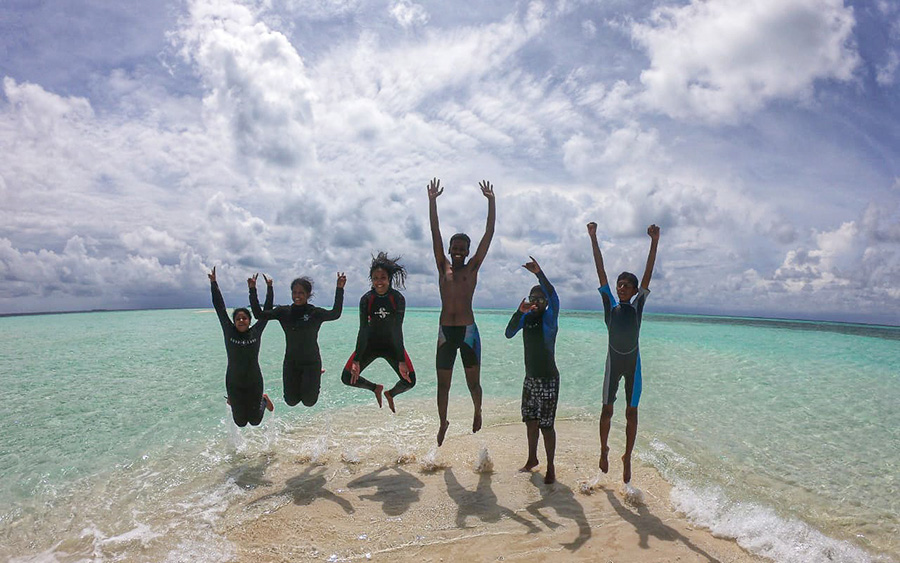 9. It is a great stress reliever
9. It is a great stress reliever
We have mentioned it earlier that the breathing pattern for diving is similar to a meditative breathing pattern. Meditating is a great remedy for stress too. Slower breathing promotes calmness. Not just that, but when we are diving, we are focused on the environment around us which enables us to completely forget work, family, relationships or financial issues. Having this mental ‘time out’ gives the body a chance to rest. It brings the nervous system back to its natural balance. Studies have shown that a relaxed and calm mind promotes a positive mental attitude. It helps you deal with your issues in a calm and rational manner. It reduces feelings of depression.
Corona Virus & Fitness
There are many uncertainties and unknowns surrounding the Corona Virus pandemic. But one thing that is widely believed to be true is that the effects of COVID-19 are generally less severe in a person who is physically healthy and fit. We know, you may not cherish the thought of going to the gym to work on your fitness, but how about going diving instead!
Scuba Diving in India
At Plant Scuba India, we are following recommendations regarding scuba diving health and hygiene standards. We have new procedures in place to ensure that gear is disinfected and all recommendations are being met. If you have tested positive for COVID-19, you will require a doctors medical clearance, as a precautionary measure, prior to participating in any in-water activities. Contact us by email and we can provide you with a form for your doctor to sign.
If you’d like to learn to dive or to join us for fun diving in India, or if you have any questions about scuba diving for Fit India, health and diving, or corona virus and diving, contact us on: holidays@planetscubaindia.com.
We look forward to diving with you soon!
Text: Sarah Ann Wormland, PADI
Photos (in order of appearance): Madhava Reddy, David ST Loh, Gopala Krishnan
9 ways to responsibly scuba dive in India
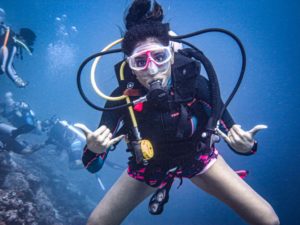
Being a responsible scuba diver is important wherever you are diving. But it’s even more so in India because of our dense population. The great news about being a responsible scuba diver is that it has a major feel-good factor, and together we can make a difference and raise awareness – all of which leads to healthier dive sites and the ongoing development of scuba diving in India. Here are some tips to responsibly scuba dive in India, how they help in your underwater adventure, and how they can help you in your daily life too!
1. Get certified to scuba dive in India
If you want to scuba dive, get certified! This not only increases your personal safety underwater, it also means you’ll learn about how to dive to limit your impact on the coral reef and marine life. This in turn means that dive sites stay preserved for you and other divers to enjoy, dive after dive. If you are not certified to dive, sign up for the PADI Open Water Diver Course – you can even start learning online from home now! Once you are a certified diver, you’ll be recognized as such by dive centers all around the world. Yes, you will have more places to explore and more buddies to meet and dive with!
2. Don’t touch coral reef or marine life
Did you know that corals are living animals? You need to treat corals with the same respect you would give other creatures. Touching corals can not only lead to nasty stings, but you can actually infect the reef. Contamination from humans can be deadly for coral reefs, and for the fish living there. Hard coral is often covered with a thin layer of live tissue which protects it. When touched by humans, this layer gets damaged. The basic rules of sustainable scuba diving are: (1) don’t touch the corals and (2) don’t take any corals or shells out of the ocean.
3. Be in control of your movements
Having good control underwater comes through proper training and supervised practice. If you are not a certified diver, sign up for a Discover Scuba Diving program. You’ll learn some basic skills to keep you and the reef safe, followed by an amazing dive in the ocean with an instructor. If you want to get certified, take the Open Water Diver Course and commit to learning to scuba dive in India. Want to develop your diving skills further? Why not take the PADI Advanced Open Water Diver course? Being in control of your movements makes you look more accomplished underwater and you’ll also be ensuring the longevity of the reef by not making contact with it. As an ‘in control’ diver, beginners will look up to you and follow your example.
4. Maintain good buoyancy
Divers with good buoyancy control are looked up to wherever they dive. Be a good role model with excellent diving skills, and you’ll gain the respect of your buddies in no time. Good buoyancy control also means that your air will last longer so you can dive for longer. You’ll be able to avoid crashing into a reef or making contact with the bottom. Also, you’ll also be able to maneuver better, which means you can get closer to the marine life and corals. You’ll reduce your stress and anxiety levels in the process as well. Say hello to more relaxing and comfortable dives.
5. Invest in the right equipment
Scuba diving in India is still a relatively new activity. There’s yet an element of ‘cool-ness’ attached to it. You have to have the right equipment if you want to look and feel great underwater. And it has to fit correctly! Over-sized gear or a too-snug fit are both uncomfortable and unsafe. Ask us about which scuba diving equipment you should have and how it should fit for the best performance. If your gear isn’t the right size for you, you’ll struggle with buoyancy and are more likely to damage the reef, since your focus remains on your gear and not on your surroundings. All your scuba gear needs to be tucked away. Nothing should be trailing or dangling, as it can cause to damage to the reef or even lead to entanglement.
6. Don’t pollute the water
For the sake of both land and marine species, it is increasingly important today to be responsible and try your best to reduce your environmental footprint. Never throw trash, even organic, in the ocean. Pick up any trash you see while diving, and others will follow your example. Role model good behavior at home too. Try to reduce your use of plastic by using eco-bags for your shopping and think twice about buying items that are overly packaged. In India, we generate a huge amount of plastic waste. Be a trailblazer and get active on social media about what you are doing to reduce your own plastic consumption.
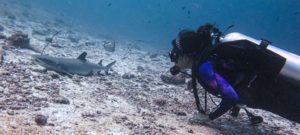
7. Educate yourself and others
The more people know about something, the greater their interest in protecting it. Learn about corals and marine life and share your findings with others. Not only will you impress them with your knowledge, but you’ll also help create a new generation of educated Indian scuba divers who, like you, want to protect our amazing underwater world.
8. Be an ocean advocate
Being a scuba diver is not just about what we do when we are diving in India. It’s about our behavior at home too. Be a diver everyday by becoming aware of global issues such as climate change and overfishing. Join online conservation groups and be a leading voice on social media. We all know the power of people, so help start a wave of awareness and change!
9. Promote scuba diving in India
Share you underwater pictures and talk with your friends, family and neighbors about your adventures and experiences when scuba diving in India. The more Indian divers there are, the more powerful our collective voice becomes.
Are you ready to put these points into action? Get started by booking a PADI scuba diving course, or your next dives now! Contact us via our online contact form or send us an email to: holidays@planetscubaindia.com
— BY SARAH WORMALD, PADI
Mining to blame for islands to sink beneath waves
Two small islands in South Asia’s first marine biosphere reserve have sunk into the sea primarily as a result of coral reef mining, experts say.
The islets were in a group in the Gulf of Mannar, between India and Sri Lanka.
The Indo-Pacific region is considered to contain some of the world’s richest marine biological resources.
The group’s 21 islands and islets are protected as part of the Gulf of Mannar Marine National Park, covering an area of nearly 560 sq km (216 sq miles).
Fishermen had indiscriminately and illegally mined invaluable coral reefs around the islets of Poomarichan and Villanguchalli for many decades, said S Balaji, chief conservator of forests and wildlife for that region of Tamil Nadu state.
“The absence of any regulations prior to 2002 led to illegal mining of the coral reefs, which came to an end when environmental protection laws were enacted,” he told the BBC Tamil Service.
Mr Balaji said rising sea level as a result of global warming was also a factor behind the islands’ submergence.
But this was questioned by Simon Holgate from the Proudman Oceanographic Laboratory in Liverpool, UK, who said observations showed that the sea level in the region had been rising slower than the global average.
“I think that global sea level rise had little impact on the disappearance of these islands and it must be due to other reasons, possibly the mining of coral reefs,” Dr Holgate told BBC News.
Though these islets were only 3-5m (10-15 ft) above sea level, their submergence sounded an alarm bell about the danger many more small islands faced in the long run, according to Mr Balaji, who is also director of the Gulf of Mannar Biosphere Reserve Trust (GOMBRT).
The Gulf of Mannar was chosen as a biosphere reserve by the Indian government in 1989 because of its biological and ecological uniqueness, and the distinctive socio-economic and cultural profile shaped by its geography.
Most of the 21 islands are uninhabited, and the corals were mined for use as a binding material in the construction industry, as they were rich in calcium carbonate.
Rich biodiversity
The biosphere reserve is a storehouse of about 3,600 species of marine flora and fauna.
Many more wait to be studied, said Deepak Samuel, marine biologist and project associate with the Energy and Environment Unit of the UN Development Programme (UNDP). 
“The Gulf of Mannar is a unique reserve with ecosystems like coral reefs, mangroves and seagrass,” Mr Samuel said.
“It is a nursery for shell and fin fishes, which means the entire breeding and juvenile raising takes places in these three ecosystems.”
More than 300,000 fishermen depend on the Gulf of Mannar for their livelihood. It is also the dwelling place for many endemic species, notably the dugong or “sea cow”.
Studies have proved that this gulf is home to 117 species of corals belonging to 37 genera, and 13 out of the 14 species of seagrasses in Indian seas.
The area has also been famous for pearl harvesting for over 2,000 years.
According to marine biologists, a quarter of the 2,000-plus fin fish species in Indian waters are in this gulf, making it one of the region’s most diverse fish habitats.
What you are going to miss
I hope you have all booked your places for our Maldives Livaboard Trip in September. If you haven’t this is what you are going to miss out on.I pity you[youtube=http://www.youtube.com/watch?v=yihoIvUBDM4]
Are All Sharks Dangerous?
A very common question and here is the most sensible answer to that question.
No. There are around 300 different species of sharks, only 40 of which are known to have attacked
people. One of the most dangerous sharks in North America is the great white shark, found along the Pacific coast between Mexico and southern Canada. Another one to watch out for is the tiger shark, which lives in the warmer Atlantic waters off the coast of Florida and around the islands of Hawaii. Shark attacks really are pretty rare. For instance, there are usually only two or three reported in Hawaiian waters each year. There are different ideas about why sharks attack people. Tiger sharks, it seems, may attack because they get confused in murky water — and mistake surfers in black wet suits for seals. Reef sharks seem to attack because they are territorial animals, protecting their piece of the sea. The whale shark, which has 5,000 teeth and can grow up to 50 feet long, is the largest type of shark. However, it prefers food like small fish, shrimp and plankton, and therefore is not dangerous to people.
